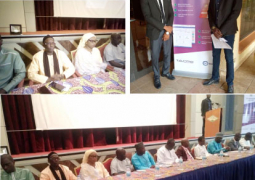It
has been reported that “currently, over 65 countries and territories” around
the world are “battling transmission of the Zika virus”.
The
Zika virus, said to have recently reached Africa, risks spreading to many more
countries in Africa and Asia from other parts of the world, such as Latin and
South America.
Earlier
this year, the World Health Organization declared the virus —mainly spread by
the bite of the Aedes mosquito and sometimes sexual transmission — an
international health emergency.
According
to Medical Daily, a specialized media outlet on health issues, a new study has
suggested that the two billion residents of the Philippines, Vietnam, Pakistan
and Bangladesh could be particularly vulnerable to a Zika outbreak because of
their limited health resources.
“The
impact on populations will also depend heavily on the country’s ability to
diagnose and respond to a possible outbreak. Our findings could offer valuable
information to support time-sensitive public health decision-making at local,
national, and international levels,” Dr Kamran Khan, study author from St
Michael’s Hospital in Toronto, told the BBC.
Zika
experts have also stated that the virus’ risk of spreading is at its highest
over the summer months when people are traveling between America and other
parts of the world. “It’s no surprise that travel and trade will help spread
the Zika virus around the world from Latin and South America.”
Warm
temperatures also mean the Zika-carrying mosquitoes can survive longer. The
virus, blamed for neurological disorders and birth abnormalities in Brazil,
recently reached Africa.
“While
this study reminds us that many parts of the world have ideal conditions for
the virus to take hold it can’t pinpoint exactly where this will happen,” said
Jonathan Ball, professor of molecular virology at the University of Nottingham.
“This
is a virus that has circulated for years in parts of Africa and Asia and so,
many of these people may already have been exposed and have protective
immunity.”
On
Friday 2 September 2016, Singapore announced that its total Zika virus count is
up to 189 in just one week.
We
in The Gambia should, therefore, be vigilant and continue our watertight
healthy security and safety measures to prevent the occurrence of any such
diseases. Our biweekly cleansing
exercise must also be seen to be conducted properly to keep our environment
always clean and free from harmful
insects as well as pathogens, which may cause us serious health hazard.
International
health agencies authorities, such as the World Health Organisation, have stated
that the viral infections of Zika typically occur in tropical climates, and at
present, there is no treatment or cure for the virus.
“Zika
is transmitted in a manner very similar to that of Malaria transmission;
through mosquito bites”
Stephen
Nelson




